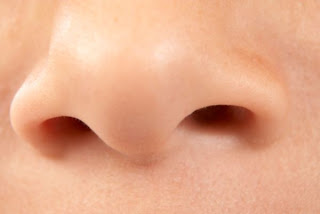Today, the world's top odor scientists are gathering in Huntington Beach, California (Orange County) for the 35th annual meeting of the Association for Chemoreception Sciences. When odor researchers get together, they often talk about flavor, and so it is no surprise that the conference is sponsored by Pepsico, which owns Pepsi, Frito Lay, Tropicana, Quaker, and Gatorade. The other top sponsor is probably less well known, except among food scientists -- Givaudan, the Swiss flavor and fragrance concocters, in whose labs the hundreds of chemical odor compounds that mingle in every flavor are dissected, analyzed, and recombined intro wondrous new combinations (like a picanha*-flavored potato chip).
In chapter four of Mind Over Mind, "Accounting for Taste," I write about how the odor of food and drink wraps our sense of taste and our taste preferences in layers of expectations and emotional associations. Much of the research to be presented at the smell-science meeting speaks to effects of different smells on the brain and the impacts of cognitive impairment, such as Alzheimer's and autism, on smell and taste. One panel discussion focuses on how different tastes signal the production of gut peptides that regulate how hungry we feel and how much we subsequently eat. And then there are the more esoteric topics, which I share here for your reading pleasure:
"The Effects of Aroma of Baked Cinnamon Bun on Stability"; "Tests of Retronasal Smell in Children: Which Flavored Jelly Bean Works Best?"; "Temperature of Served Water Can Influence Sensory Perception and Acceptance of Subsequent Food."
And my favorite, due to its creepiness: "Three-Minute Smell Test Predicts Risk of Death" in which University of Chicago researchers measured the sense of smell of about 3,000 older people and then followed up with them for five years. Independent of major mortality risk factors such as smoking or disease, the people with a poor sense of smell were three times more likely to be dead in five years than those with a normal sense of smell. Sniff.
*picanha is a Brazilian term for a fatty, salty morsel of grilled beef
In chapter four of Mind Over Mind, "Accounting for Taste," I write about how the odor of food and drink wraps our sense of taste and our taste preferences in layers of expectations and emotional associations. Much of the research to be presented at the smell-science meeting speaks to effects of different smells on the brain and the impacts of cognitive impairment, such as Alzheimer's and autism, on smell and taste. One panel discussion focuses on how different tastes signal the production of gut peptides that regulate how hungry we feel and how much we subsequently eat. And then there are the more esoteric topics, which I share here for your reading pleasure:
"The Effects of Aroma of Baked Cinnamon Bun on Stability"; "Tests of Retronasal Smell in Children: Which Flavored Jelly Bean Works Best?"; "Temperature of Served Water Can Influence Sensory Perception and Acceptance of Subsequent Food."
And my favorite, due to its creepiness: "Three-Minute Smell Test Predicts Risk of Death" in which University of Chicago researchers measured the sense of smell of about 3,000 older people and then followed up with them for five years. Independent of major mortality risk factors such as smoking or disease, the people with a poor sense of smell were three times more likely to be dead in five years than those with a normal sense of smell. Sniff.
*picanha is a Brazilian term for a fatty, salty morsel of grilled beef



